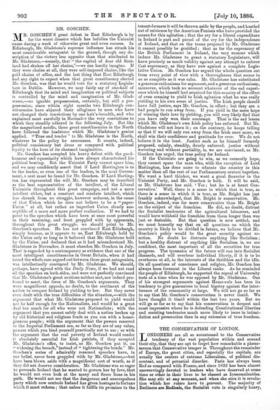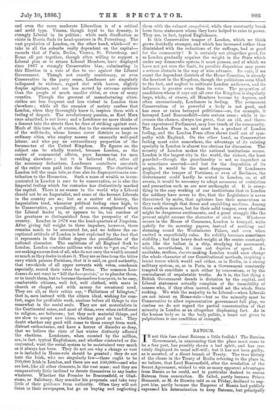THE CONSERVATISM OF LONDON.
T ONDONERS axe all so accustomed to the Conservative tendency of the vast population within and around their city, that they are apt to forget how remarkable a pheno- menon that Conservative temper is. Throughout the remainder of Europe, the great cities, and especially the capitals, are usually the centres of extreme Liberalism, of political dis- content, and of potential disorder. Paris has always been Red as compared with France, and since 1832 has been almost unswervingly devoted to leaders who have deserved at some time or other in their lives to be classed as Irreconcileables. She may stir at -any moment, and when she stirs it is revolu- tion which her rulers have to prevent. The majority of Berliners-are Badicale,-the Socialist vote is singularly heavy, and even the more moderate Liberalism is of a critical and acrid type. Vienna, though loyal to the dynasty, is strongly Liberal in its politics ; while such disaffection as exists in Russia finds its head-quarters in St. Petersburg. The vast population of London, on the other hand, which—if we take in all the suburbs really dependent on the capital— exceeds that of Paris, Berlin, Vienn3, St. Petersburg, and Rome all put together, though often willing to support a Liberal plan or to return Liberal Members, have displayed since 1867 a strongly Conservative bias,, culminating in this Election in a vote of five to one against the Liberal Government. Though not exactly reactionary, or even Conservative in the party sense, Londoners are singularly indisposed to violence, regard riot with horror, slightly despise agitators, and are less moved by extreme opinions than the people of much smaller cities, or even of many counties. Though the greatest of manufacturing cities, strikes are less frequent and less violent in London than elsewhere ; while all the enemies of society confess that London, when they thoroughly know it, inspires them with a feeling of despair. The revolutionary passion, as Karl Marx once admitted, is not here ; and a Londoner no more thinks of a descent into the streets than he does of striking against rent. Much of this tone is, of course, due to the enormous numbers of the well-to-do, whose houses cover districts as large as ordinary cities, who employ masses of unusually well-paid labour, and who pay an extraordinary proportion of the Income-tax of the United Kingdom. No figures on the subject can be wholly trusted, because London, as the centre of commercial affairs, pays Income-tax for men residing elsewhere ; but it is believed that, after all the necessary deductions, Londoners contribute one-sixth of the entire sum paid into the Treasury. The charities of London tell the same tale, as does also its disproportionate con- tribution to the House-tax. Such a mass of wealth as is con- centrated in London is sure to be conservative, as is also the Imperial feeling which for centuries has distinctively marked the capital. There is no reason in the world why a Liberal should not be an Imperialist, and some of the keenest Liberals in the country are so ; but as a matter of history, the Imperialists tend, whenever political feeling rises high, to be Conservative, a peculiarity, of course, strengthened when the Liberal leader is, or appears to be, too careless of the greatness as distinguished from the prosperity of the country. London in 1878 was the head-quarters of Jingoism. After giving full weight to these impulses, however, there remains much to be accounted for, and we believe the ex- ceptional attitude of London is best explained by the fact that it represents in the fullest degree the peculiarities of the national character. The ambitions of all England flock to London. London contains millions who wish to "get on," who are seeking success first of all, who do not envy the wealth around so much as they desire to share it. They are so free from the bitter envy which poisons Parisians, that it is said, on good authority, that two-thirds of all upper servants with votes, coachmen especially, record their votes for Tories. The common Lon- doners do not want to "kill the bourgeoisie," or to plunder them, or to insult them, but to become themselves bourgeois, to be easy, comfortable citizens, well fed, well clothed, with seats in church or chapel, and with money for occasional need. They are all, as their critics say, "Philistines of Islington," that is, men imbued with the citizen ideal, wishing for com- fort, eager for profitable work, anxious before all things to rise somewhat in the social scale. They are not materialists in the Continental sense, and most of them, even when indifferent to religion, are believers ; but they seek material things, and are slow to accept new ideas, whether good or bad. They doubt whether any good will come to them except from work, distrust enthusiasms, and have a horror of disorder so deep, that we believe the riots of last winter distinctly affected the elections. Londoners, when counted by the million, are, in fact, typical Englishmen, and whether contented or dis- contented, want the social system to be maintained very much as it always has been. They do not see why a change so vast as is included in Home-rule should be granted ; they do not hate the Irish, who are singularly few—there ought to be 700,000 Irish in London, and there are not 100,000—and who are lost, like all other elements, in the vast mass ; and they are comparatively little inclined to devote themselves to any leader whatever. Whether the Premier be Beaconsfield, or Glad- stone, or Salisbury, they consider his proposals, and take very little of their guidance from authority. Often they will not listen to their newspapers, but go on buying and neglecting them with the calmest sang-froid, while they constantly break loose from statesmen whom they have helped to raise to power. They are, in fact, typical Englishmen.
Is this Conservative temper of London, which we think grows decidedly stronger, and which has increased rather than diminished with the reductions of the suffrage, bad or good for the community ? It is certainly not altogether good, for as London gradually acquires the weight in the State which under any democratic system it must possess, and of which we have not yet seen the limit, its peculiar disposition may prove a serious obstacle in the way of wise advance. Its vote if we count the dependent districts of the Home Counties, is already the heaviest in the Kingdom, though the politicians seem blind to the fact, and neglect to cultivate London audiences, and its influence is greater even than its vote. The proportion of candidates whom it rays out all over the Kingdom is singularly large, while, of course, all Members become by degrees, and often unconsciously, Londoners in feeling. The permanent Conservatism of so powerful a bay is not good, and has once or twice betrayed politicians—as, for example, it betrayed Lord Beaconsfield—into serious error ; while it in- creases the chance, always too great, that an old, and there- fore experienced Parliament, may lose touch of the community. The London Press is, and must be, a product of London feeling, and the London Press often shows itself out of sym- pathy with England. On the other hand, as Conservative feeling must exist somewhere, the advantage of its existing specially in London is almost too obvious for discussion. The security of London makes the national institutions secure. London is the largest city in the world, the richest, the least guarded—though the guardianship is not so imperfect as is sometimes asserted—and but for the disposition of its people, it would be the most dangerous. If Londoners displayed the temper of Parisians, or even of Berliners, the Government could hardly be seated in London, or, at all events, it would be necessary to adopt measures of restriction and precaution such as are now nnthought of. It is every- thing to the easy working of our institutions that in London the soldiery have never to fire, that the Legislature is never threatened by mobs, that agitators lose their momentum as they rush through that dense and unyielding medium. Among those endless masses, but for their solid temper, even elections might be dangerous excitements, and a great struggle like the present might assume the character of civil war. Whatever occurs in the House of Commons, London is tranquil, waits quietly for its morning papers, instead of seething and storming round the Westminster Palace, and even when excited is superficially calm. Its solidity becomes sometimes stolidity ; but that heavy dead-weight at the centre constantly acts like the ballast in a ship, steadying the movement, which, nevertheless, it does not deprive of speed. An excitable, restless, emeute-making London would soon change the whole character of our Constitutional methods, inspiring a latent terror which would end either, as in Berlin, in a strong military system, or, as in Paris, in a Government constantly. tempted to conciliate a mob either by concessions, or by the concealment of unpalatable truths. As it is, the last thing a British Government dreads is dictation by the capital, and Liberal statesmen actually complain of the immobility of masses who if they often moved, would set the whole State rocking. Viire wish the majority to be Liberal—when Liberals are not intent on Home-rule—but as the minority must be Conservative to allow representative government full play, we confess we do not regard the partial concentration of that minority in London as an altogether displeasing fact. As in the human body so in the body politic, a heart not given to palpitations is one condition of strength.

















































 Previous page
Previous page